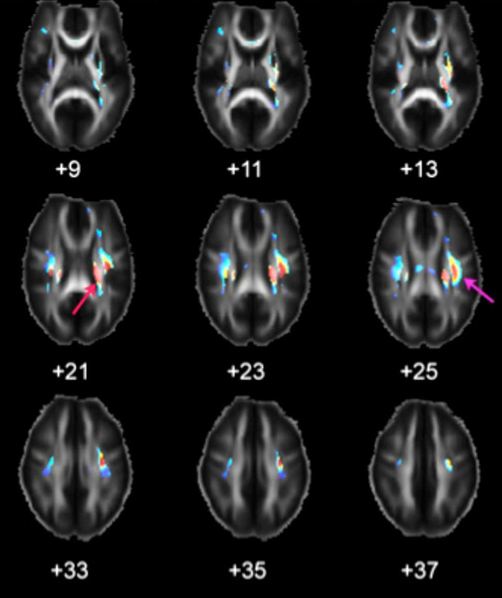Genetic variants build a smarter brain
June 21, 2012 | Source: Science Now

Brain scan data showing regions where two of the newly identified SNPs interact with each other to affect white matter tract integrity (credit: Paul Thompson/UCLA)
Taking a step in understanding how genes influence intelligence, an international team of scientists has identified a network of genes that may boost performance on IQ tests by building and insulating connections in the brain.
Intelligence runs in families, but although scientists have identified about 20 genetic variants associated with intelligence, each accounts for just 1% of the variation in IQ scores.
Because the effects of these genes on the brain are so subtle, neurologist Paul Thompson of the University of California, Los Angeles, devised a new large-scale strategy for tackling the problem.
In 2009, he co-founded the ENIGMA Network, an international consortium of researchers who combine brain scanning and genetic data to study brain structure and function.
Earlier this year, Thompson and his colleagues reported that they had identified genetic variants associated with head size and the volume of the hippocampus, a brain structure that is crucial for learning and memory. One of these variants was also weakly associated with intelligence. Those carrying it scored on average 1.29 points better on IQ tests than others, making it one of the strongest candidate intelligence genes so far.
The researchers have now used the same strategy to identify more genetic variants associated with brain structure and IQ. In the new study, they identified 24 genetic variations within six different genes, all of which were linked to differences in the structural integrity of major brain pathways. “We measured the insulation of the neural pathways,” says Thompson. “This affects how fast nervous impulses are routed around the brain. If the pathways are insulated poorly, the brain functions less efficiently and is less resistant to disease.”
Many of the genes were already known, but “most haven’t been linked to brain integrity before,” says Thompson. He adds that the genes “help to make cell membranes and connections” in pathways that are involved in spatial abilities and working memory, which allows us to store information for short periods of time while performing mental tasks.
The researchers also found that some of the variants are associated with intelligence, in that individuals carrying them performed several points better on standardized IQ tests than others.